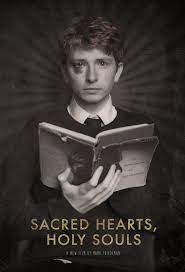
SACRED HEARTS, HOLY SOULS
US, 2014, 39 minutes, Colour.
Harrison Tanner Dean, Quinn Gasaway, Schaefer Bourne, C.Tucker Steinmetz, Karen Q.Clark, Jim Linsley.
Directed by Mark Thiedeman.
A brief, 39 minute narrative film, set in an Arkansas Catholic Boys’ Boarding school named after the young saint, Dominic Savio. The tagline for the film and repeated in sites and reviews on the film has a tone which is partly right, partly wrong, “Two teenage misfits at an all-boys Catholic boarding school become unlikely comrades in a struggle against hormonal bullies and dinosaur-aged priests.”
The central character is Max (Harrison Tanner Dean), rather non-descript in appearance, aware of his gay orientation but keeping it secret, and having made a suicide attempt with tablets. He is the subject of bullying by the other boys, initially taunts, then physical attack. However, a new roommate (Quinn Gasaway) befriends him and they share conversation, Max opening up, interest in books and art.
The film opens with a sex education class, the teacher with a Roman collar but the credits simply call him Jim Linsley without reference to Reverend or Father. He is more sympathetic, talk to the boys with frankness about masturbation, but emphasising sexual activity for reproduction.
The main priest in the film is Father Alphonsus (C. Tucker Steinmetz), the Rector of the College, bearded, bear-looking big man, and big voice. “Overbearing priest. The priest punishes students who smoke by smoking cigars with trash barrels over their heads, and even demands that two students who quarrel in the hallway must box each other in front of the whole school for humiliation on the weaker one’s part.” (Tanner Smith, Smith’s Verdict, 17 May 2014.)
He targets Max, calls him in, supervises the fight between the two boys. He sees through boys, one student refuses to write an application to the school, saying he would rather go to Hell, Father Alphonsus replies that he would not give him the pleasure of being expelled.
To counterbalance the difficulties, there is a very sympathetic nun counsellor who understands Max, his orientation and self-image, and is supportive. She asks Max which religious denomination has best mental health, citing Catholics, especially because of confession, not only its confidentiality but its opportunity for those confessing to speak frankly about themselves. The sister also urges Max to read the poems of Emily Dickenson and makes comparisons between him and her reclusive life.
Mark Thiedeman, from Arkansas where all his films are made, takes on sexual orientation themes in all his films, mainly short films, but a feature film, Last Summer, about two friends in an Arkansas town, one moving away for studies, the other, sportsman, staying comfortable in the town.
The films are not particularly explicit in showing sexual activity. Rather, the emphasis is frequently on the homoerotic gaze. And this is given something of a religious dimension by very frequent inclusion of stills of classical religious art, especially from Caravaggio. There are also a number of focus points on traditional images of the Sacred Heart. And, there is a classical music background, especially from Chopin.
The film has something of a tongue-in-cheek ending, the bully pounding Max during the fight, though Max has had some training from his friend. The climax is that Max, knocked onto the ground, suddenly pulls down his opponent’s pants and gives him a swift kick. He is a winner – comfortable then in joining the other boys in class, in exercise, in self-confidence.